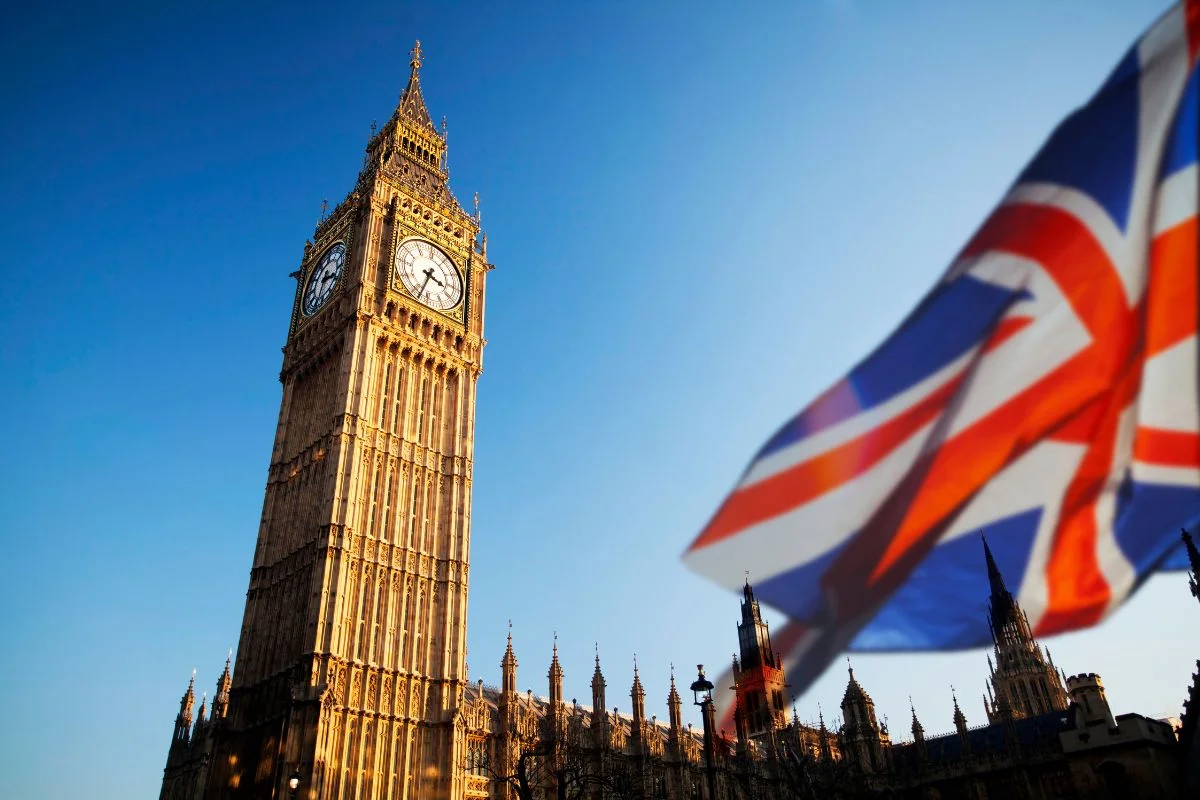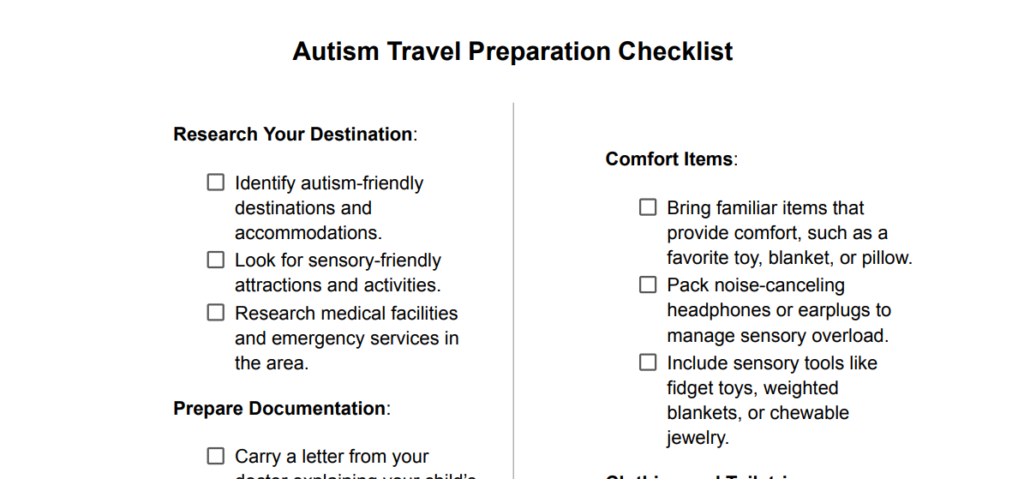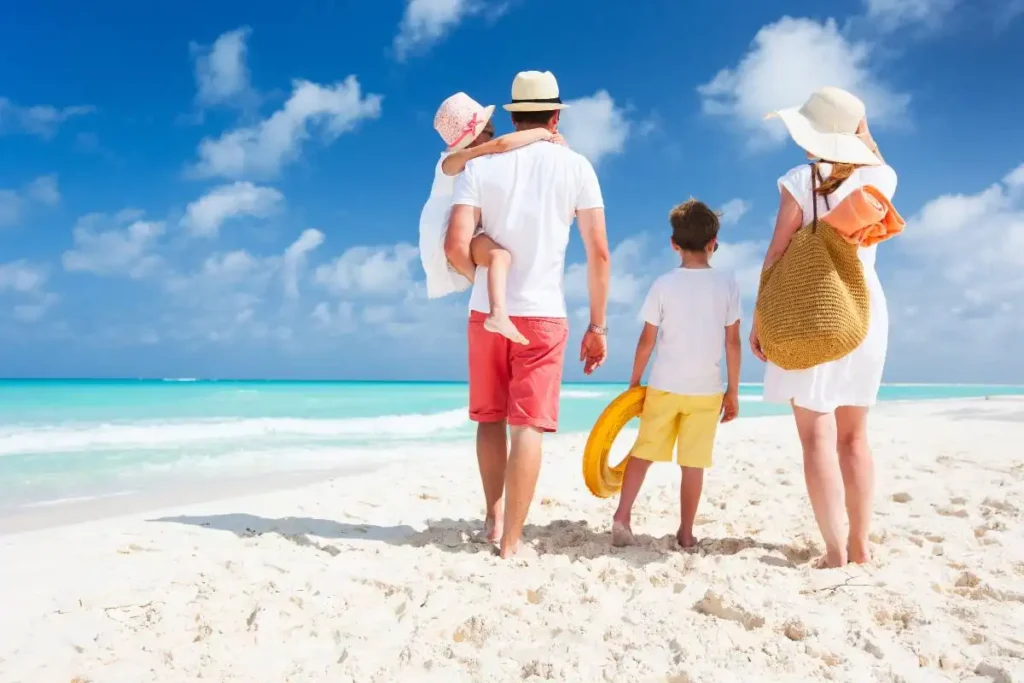Autism is a neurodevelopmental disorder that affects communication, social interaction, and behavior. Traveling can be a challenge for families with children on the autism spectrum. However, many destinations in Europe provide a welcoming and inclusive environment for individuals with autism. These destinations offer a range of activities and accommodations that cater to the unique needs of these individuals.
Understanding Autism Spectrum Disorder is an essential step in planning an autism-friendly holiday. Autism is a spectrum disorder, and individuals with autism have a wide range of abilities and challenges. Some individuals may have difficulty with sensory processing, while others may struggle with social interaction. It is important to understand the specific needs of the individual with autism and plan accordingly.
Key Takeaways
- Autism is a spectrum disorder, and individuals with autism have a wide range of abilities and challenges.
- Planning an autism-friendly holiday requires understanding the specific needs of the individual with autism.
- Many destinations in Europe provide a welcoming and inclusive environment for individuals with autism.
Criteria for Autism-Friendly Holidays
When planning a holiday for a family with an autistic child, it is important to consider certain criteria to ensure that the holiday is enjoyable and stress-free for everyone. Here are some of the key factors to consider when choosing an autism-friendly holiday:
1. Sensory-Friendly Environment
Many autistic children are sensitive to their environment and can be easily overwhelmed by noise, crowds, and bright lights. Therefore, it is important to look for a holiday destination that provides a sensory-friendly environment. This could include a quiet and peaceful location, low lighting, and minimal noise. Some hotels and resorts may offer sensory rooms or other facilities that cater to the needs of autistic children.
2. Structured Activities
Autistic children often thrive on routine and structure, so choosing a holiday that offers structured activities can be helpful. This could include guided tours, workshops, or other organized activities that have a set schedule. Having a clear routine can help autistic children feel more comfortable and relaxed.
3. Accessible Facilities
When choosing a holiday destination, it is important to consider the accessibility of the facilities. This could include wheelchair accessibility, accessible toilets, and other facilities that cater to the needs of people with disabilities. It is also important to consider the accessibility of the local area, such as the availability of public transport or accessible taxis.
4. Understanding Staff
Finally, it is important to choose a holiday destination where the staff are understanding and knowledgeable about autism. This could include staff who have received specific training in how to interact with autistic children, or staff who have experience working with people with disabilities. Having staff who are understanding and empathetic can make a huge difference in the enjoyment of the holiday for both the child and their family.
By considering these criteria, families can choose an autism-friendly holiday that is enjoyable and stress-free for everyone.
Top Destinations in Europe
Planning a vacation in Europe for individuals with autism? Great choices include the United Kingdom, where Legoland Windsor Resort has a special sensory room, Spain with its diverse attractions, and Germany, known for being family-friendly. Norway, supported by the Autism Society of Norway, is also a good option. These places not only offer beautiful scenery and interesting culture but also make sure that everyone, including those with autism, can have a fantastic and comfortable holiday experience.
1. United Kingdom
The United Kingdom is a great destination for families with autistic children. The country offers a range of attractions and activities that cater to the needs of children with autism. The Legoland Windsor Resort, for example, has a dedicated sensory room for children with autism, while the Warner Bros. Studio Tour London – The Making of Harry Potter offers a quiet room for visitors who need a break from the crowds. The National Autistic Society also offers a list of autism-friendly attractions and events across the UK.
2. Spain
Spain is another popular destination for families with autistic children. The country has a warm climate, beautiful beaches, and a rich cultural heritage. The PortAventura World theme park in Salou, for example, has a range of autism-friendly facilities, including quiet rooms, fast-track passes, and sensory guides. The Barcelona Aquarium also offers a sensory-friendly visit for visitors with autism.
3. Germany
Germany is also a great destination for families with autistic children. The country has a range of attractions and activities that cater to the needs of children with autism. The Europa Park theme park in Rust, for example, has a range of autism-friendly facilities, including quiet rooms, fast-track passes, and sensory guides. The Legoland Deutschland Resort also offers a range of autism-friendly facilities, including a quiet room and a sensory path.
4. Italy
Italy is a beautiful country with a rich cultural heritage. The country also has a range of attractions and activities that cater to the needs of children with autism. The Gardaland theme park in Castelnuovo del Garda, for example, has a range of autism-friendly facilities, including quiet rooms, fast-track passes, and sensory guides. The Rome Biopark also offers a range of autism-friendly facilities, including a quiet room and a sensory path.
5. France
France is another popular destination for families with autistic children. The country has a range of attractions and activities that cater to the needs of children with autism. The Disneyland Paris theme park, for example, has a range of autism-friendly facilities, including quiet rooms, fast-track passes, and sensory guides. The Cité des Sciences et de l’Industrie in Paris also offers a range of autism-friendly facilities, including a quiet room and a sensory path.
Accommodation Options
When planning an autism-friendly holiday in Europe, choosing the right accommodation is crucial. The following are some options to consider:
1. Specialized Resorts
Many specialized resorts cater to families with children on the autism spectrum. These resorts offer a range of activities and amenities designed to meet the unique needs of these families. For example, the Sirenis Seaview Country Club in Ibiza, Spain, offers sensory rooms, a sensory pool, and a variety of activities, including horse riding and dolphin watching.
2. Autism-Certified Hotels
An increasing number of hotels in Europe are becoming autism-certified, meaning they have undergone training and made adaptations to accommodate guests on the autism spectrum. For example, the Holiday Inn Paris – Porte de Clichy in France has partnered with the National Autism Association to provide autism-friendly rooms with visual supports, sensory toys, and noise-canceling headphones.
3. Private Rentals
Renting a private villa or apartment can be a good option for families who want more control over their environment. Websites such as HomeAway and Airbnb offer a range of properties that can be filtered by amenities such as quiet neighborhoods, fenced yards, and sensory rooms. Some property owners may also be willing to make adaptations to accommodate guests on the autism spectrum.
It’s important to note that not all accommodations marketed as “autism-friendly” may be suitable for every family. It’s important to do research and ask questions to ensure that the accommodation meets the specific needs of each family.
Travel Planning Tips
When planning a trip with an autistic child, there are several considerations to keep in mind. The following subsections provide some tips on how to make the travel experience as smooth and enjoyable as possible.
1. Choosing the Right Time to Travel
When selecting a time to travel, it is important to consider the child’s routine and preferences. For example, if the child is sensitive to noise, it may be best to avoid peak travel times when airports and train stations are crowded and noisy. Additionally, if the child has a favorite activity or interest, plan the trip around that activity to make it more enjoyable.
2. Preparing for the Trip
Proper preparation is key to a successful trip. It is recommended to create a visual schedule or itinerary to help the child understand what to expect. Pack familiar items such as favorite toys, snacks, and comfort items to help the child feel more at ease. Additionally, consider preparing a social story or visual guide to explain what will happen during travel and what behavior is expected.
3. Transportation Considerations
Transportation can be a stressful part of travel for autistic children. When possible, choose direct flights or trains to minimize travel time and avoid layovers. If the child is sensitive to noise or crowds, consider noise-canceling headphones or earplugs. Additionally, consider requesting special accommodations such as pre-boarding or a seat with extra legroom to make the journey more comfortable.
By following these travel planning tips, families can help ensure a successful and enjoyable trip for everyone involved.
Activities and Attractions
Europe offers a variety of activities and attractions that are suitable for individuals with autism. Here are some of the best options:
1. Theme Parks
Theme parks can be overwhelming for individuals with autism due to the crowds, loud noises, and bright lights. However, some theme parks offer autism-friendly accommodations such as quiet rooms, fast passes, and sensory-friendly attractions. For example, LEGOLAND Florida Resort has a quiet room with sensory-friendly toys and activities, while Sesame Place offers noise-canceling headphones and a low-sensory parade.
2. Museums
Museums can be great places for individuals with autism to learn and explore. Many museums offer sensory-friendly exhibits or activities, such as touchable exhibits and quiet rooms. For example, the British Museum in London has a dedicated sensory room with tactile objects and a sensory trail, while the National Museum of Natural History in Paris offers sensory-friendly workshops and guided tours.
3. Outdoor Adventures
Outdoor adventures can provide a sensory-rich experience for individuals with autism. Hiking, camping, and nature walks can be great ways to explore the outdoors and connect with nature. Some adventure companies offer autism-friendly accommodations, such as sensory-friendly tents and quiet areas. For example, Family Autistic Holiday Abroad offers autism-friendly camping in France, while Golden Steps ABA provides customized outdoor adventures for families with autism.
Overall, there are many activities and attractions in Europe that are suitable for individuals with autism. By researching and planning, families can find accommodations and experiences that cater to their specific needs and interests.
Support and Resources
When traveling with a family member who has autism, it can be challenging to find the right support and resources in an unfamiliar place. However, Europe has a range of organizations and emergency services that cater to the unique needs of individuals with autism. Additionally, there are communication aids available to help with verbal and nonverbal communication.
Local Autism Organizations
Various local autism organizations throughout Europe provide support and resources to individuals with autism and their families. These organizations offer a range of services, including therapy, support groups, and educational programs. Some of the notable organizations include:
- Autism-Europe: A non-profit organization that advocates for the rights of people with autism and their families in Europe.
- National Autistic Society (NAS): A UK-based organization that provides information, support, and services to individuals with autism and their families.
- Autism Society of Norway: A Norwegian organization that offers support, information, and advocacy for individuals with autism and their families.
Emergency Services
In case of an emergency, it is essential to know the emergency services available in the area. In Europe, there are specialized emergency services that cater to individuals with autism. These services are trained to handle situations involving individuals with autism and provide the necessary support. Some of the specialized emergency services include:
- Autism Alert Card: A card that provides information about an individual with autism and their communication needs in an emergency.
- Autism Response Team: A specialized team of police officers trained to handle situations involving individuals with autism.
Communication Aids
Communication can be a challenge for individuals with autism, especially when traveling to a new place. However, there are various communication aids available to help with verbal and nonverbal communication. These aids can include visual schedules, communication boards, and mobile applications. Some of the notable communication aids include:
- Proloquo2Go: A mobile application that provides a voice for individuals who cannot speak.
- Picture Exchange Communication System (PECS): A visual communication system that uses pictures to communicate.
- Boardmaker: A software program that allows users to create and print communication boards.
Overall, Europe has a range of support and resources available for individuals with autism and their families. By utilizing these resources, families can ensure a safe and enjoyable vacation for everyone involved.
Personal Stories and Reviews
When it comes to finding the best autism-friendly holidays in Europe, personal stories and reviews can be a valuable resource. Many families have shared their experiences and recommendations online, providing helpful insights into what to expect and how to plan a successful trip.
One family shared their experience on Lily & Magnolia Travel, highlighting the importance of finding accommodations that cater to their child’s needs. They recommended staying in apartments or villas rather than hotels, as they provide more space and privacy. They also suggested researching the local area to find quiet and sensory-friendly places to visit.
Another helpful resource is Limitless Travel, which offers supported holidays for adults with autism in the UK, Europe, and around the world. They provide a range of activities and excursions, including visits to sensory-friendly museums and nature reserves.
In addition to these resources, it can be helpful to connect with other families who have traveled with autistic children. Online communities such as Autism on the Seas and Autism Travel provide forums for families to share tips and advice, as well as reviews of specific destinations and accommodations.
Future Trends in Autism-Friendly Travel
As awareness of autism and neurodiversity increases, more and more travel companies are recognizing the need to provide autism-friendly holidays. These holidays are designed to create inclusive and supportive environments where individuals with autism can fully enjoy their travel experiences. Here are some future trends in autism-friendly travel:
1. Increased Availability of Autism-Friendly Holidays
There is a growing demand for autism-friendly holidays, and travel companies are responding by offering more options. In the future, we can expect to see even more destinations and accommodations that cater to the needs of autistic travelers. This will make it easier for families to find a holiday that suits their needs.
2. Improved Accessibility
Travel companies are also working to improve the accessibility of their facilities and services. This includes everything from wheelchair ramps to sensory rooms. In the future, we can expect to see even more innovative solutions that make travel more accessible for people with autism.
3. Personalized Services
As travel companies become more familiar with the needs of autistic travelers, we can expect to see more personalized services. This might include things like customized meal plans or sensory-friendly activities. By tailoring their services to the needs of each traveler, travel companies can ensure that everyone has a great holiday experience.
4. Increased Awareness and Understanding
Finally, we can expect to see increased awareness and understanding of autism among travel industry professionals. This will help to ensure that autistic travelers are treated with the respect and understanding they deserve. As more people become aware of the challenges faced by autistic travelers, we can expect to see more efforts to make travel more inclusive for everyone.












